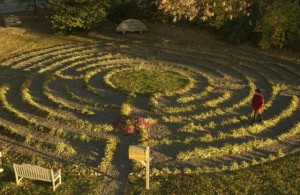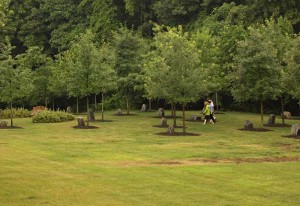 When people use the term “sacred place” they are often referring to a place of reverence of some sort. There is something about the physical location of a “sacred space” that elevates it beyond the normal, average location. Sometimes a location earns the term from historic events that happened there. For example, Gettysburg, the Civil War battlefield, is often referred to as “sacred ground” because of the thousands of lives that were lost and the monumental significance of the events that occurred there. Other sacred places hold important religious significance powerful enough that pilgrims will travel from all over the world to spend a few moments soaking in the sacred location. Sites like Bethlehem and Mecca come to mind.
When people use the term “sacred place” they are often referring to a place of reverence of some sort. There is something about the physical location of a “sacred space” that elevates it beyond the normal, average location. Sometimes a location earns the term from historic events that happened there. For example, Gettysburg, the Civil War battlefield, is often referred to as “sacred ground” because of the thousands of lives that were lost and the monumental significance of the events that occurred there. Other sacred places hold important religious significance powerful enough that pilgrims will travel from all over the world to spend a few moments soaking in the sacred location. Sites like Bethlehem and Mecca come to mind.
Sometimes these places are sacred only to a few individuals. For example, a cross or wreath next to a busy highway marking the location of a fatal accident. While it might not be sacred to the morning commuter stuck in traffic, to family members of those lost, there is a special significance to that specific place that triggers emotions and reflection and may even provide a chance to heal.
The one thing that all of these sacred places have in common is that they have the power to inspire reflection, create a sense of intimacy or even transform visitors in some way.
Time spent in nature can often have the same reflective, intimate and healing effect as the sacred places described above. Unfortunately, the pressures of urban development often make it difficult to find a place to intimately connect with nature and experience the sacred qualities that nature provides. During the past 20 years, the TKF Foundation has worked to lessen this problem by creating open, sacred places in nature designed to provide the opportunity for deeper human experience. These Open Spaces Sacred Places are carefully designed to provide a place for visitors to pause, reflect and experience the transformational effect of being intimately connected with nature.
For the visitor who makes this connection with nature, like the sacred places described above, this place of nature also earns the title “sacred place,” at least for this one individual.
How do you define a “sacred experience?” Tell us about your “sacred place” in the comments below.

